Forrest Fenn's Treasure - Clue Compilation
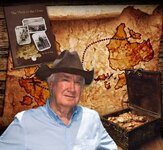
Additional clues added on May 8, 2016 are highlighted in bold lettering
I created this thread in the hopes of helping fellow Forrest Fenn treasure seekers connect the dots and find the treasure. I have been sorely disappointed in most forums and websites devoted to the search. More often than not (despite the best efforts of moderators to keep a thread respectful and on subject ) the forums deteriorate into name calling, hocus-pocus, ego-boosting and a lot of useless chatter. Often becoming so cluttered and convoluted that an entire weekend of digging is required to find a single “gem”.
) the forums deteriorate into name calling, hocus-pocus, ego-boosting and a lot of useless chatter. Often becoming so cluttered and convoluted that an entire weekend of digging is required to find a single “gem”.
There is also the simple matter that very few want to give up “good” information lest it lead someone else to the treasure before them.
In an effort to share what I know about the location of Forest Fenn's treasure I have gathered everything I have collected over the years and made it available here. I have tried to remain as factual as possible but obviously there will always be some overlap between facts and conjecture - so please do not think I am an authority on anything. This information may lead you in the right direction or it might send you down a rabbit hole.
Please keep in mind, I have no answers and I am as blind as everyone else. I am nothing more than a fellow treasure seeker like yourselves and I do not know where the treasure is, but I do believe it exists and is out there waiting for anyone who can figure out the 9 clues and find it.
For some of you who have been on the hunt for a while now there may be nothing new here, but for those new to the chase this might help you get your search off the ground. I encourage anyone who would like to contribute anything, preferably more factual than conjecture, to please do so. If there is anything here that is incorrect then please feel to chime in an let us all know.
I wish everyone the best. Happy Hunting!
Here's the Poem;
A straightforward analysis the poem’s components;
Strong suppositions
Weak suppositions
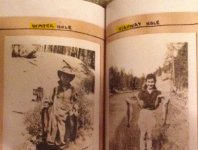
Here's the clues that I know;
Comments made by FF
•Don’t let logic distract you from the poem (2-12-2016)
•Chest weights 42 pounds plus, best to have gloves (3-11-2016)
•If you know precisely where it is you can probably retrieve it in any weather (12-11-2015)
•Shut your engine off until spring (12-04-2015)
•A good solve is frequently lost in a poor execution (1-15-2016)
•“Until someone finds the treasure they will not know for sure that they have discovered the first clue.” (Dal’s Blog – “Forrest Gets Mail – 9 / November 2, 2015)
•“The problem searchers make is that they don’t dwell long enough on the first clue. If you can’t find the first clue you don’t have anything. People driving down the street looking for a blaze, because THAT’S ONE OF THE CLUES, but you can’t start in the middle of the poem and find the treasure.” (Outside: Live Bravely – August 11, 2015)
•“If I was standing where the treasure chest is, I see trees, I see mountains, I see animals, I’ll smell wonderful smells of pine needles or pinon nuts, sage brush. And I know the treasure chest is wet.” – (New Mexico True Story – February 4, 2015)
•Forrest responded the next day saying – “I just watched that New Mexico Tourism video again and must say that I didn’t say what I was thinking. You cannot smell a pinon nut, but those who pick them know that in doing so you get pine pitch all over your hands, and pine pitch smells about the same no matter what kind of pine tree you are talking about. Looking back I think I wanted to say I could smell pine needles, not pinon nuts. Sorry I kicked a hornet’s nest with that comment.” – (Dal’s Blog – Forrest LIVE on HuffPost.. / February 5, 2015)
•Another response – “That video didn’t have any clues.” “Fenn said if the treasure were in the wilderness, of course it would be wet….he erred in mentioning pinon nuts. He really meant pine needles” – (The New Mexican – February 8, 2015)
•What surprises me a little is that nobody to my uncertain knowledge has analyzed one important possibility related to the winning solve.” (MysteriousWritings Blog – Six Questions Yet Again with Forrest Fenn: Always a Treasure! / February 4, 2015)
•“I will say that I walked less than a few miles (whole trip of hiding the chest and treasure) if that will help. I just looked “few” up and one definition is “scant.” Why do I sound like I’m talking in circles” – (MysteriousWritings Blog – Talking in Circles/ October 13, 2014)
•“While it’s not impossible to remove the blaze it isn’t feasible to try, and I am certain it’s still there” (Dal’s Blog – The Nine Clues…Part Thirtyone / September 26, 2014)
•“There are many places in the Rocky Mountains where warm waters halt, and nearly all of them are north of Santa Fe. Look at the big picture, there are no short cuts.” (MysteriousWritings Blog – Featured Questions: Warm Waters and Geography / August 12, 2014)
•“The spot where I hid the treasure was in my mind from the time I first started thinking about the chase. It is special to me and there was never another consideration. I was going to make it work no matter what. In my reverie I often find myself stealing away to that place and I will always consider it to be mine.” (MysteriousWritings Blog – Questions with Forrest / July 5, 2014)
•“When I am in the moutains or in the desert, the last place I want to be is on a trail…..There isn’t a human trail in very close proximaty to where I hid the treasure” (MysteriousWritings Blog – Questions with Forrest / June 28, 2014)
•“No specialized knowledge is required…..My Thrill of the Chase book is enough to lead an average person to the treasure” (MysteriousWritings Blog – Questions with Forrest / June 27, 2014)
•“The clues did not exist when I was a kid but of most of the places the clues refer to did. I think they might still exist in 100 years.” (MysteriousWritings Blog – Questions with Forrest / June 25, 2014)
•“Many are giving serious thought to the clues in my poem, but only a few are in tight focus with a word that is key.” (MysteriousWritings Blog – Questions with Forrest / February 4, 2014)
•“When I hid it and was walking back to my car, I started laughing out loud and I said ‘Forrest Fenn…did you really do that?’” – (Moby Dickens Book Shop Signing / November 2, 2013)
•“There are several people that have deciphered the first two clues. I don’t think they knew it, because they walked right on past the treasure chest.”– (Moby Dickens Book Shop Signing / November 2, 2013)
•“I think kids have an advantage (finding the treasure). Don’t ask me to explain that.” – (Moby Dickens Book Shop Signing / November 2, 2013)
•“…that’s why I told people I hid the treasure chest when I was 79 or 80 years old because I don’t want the exact date to be known because I’m afraid somebody will go check the rental car records and how many miles did Mr. Fenn put on the truck or the car…so I don’t answer those kinda questions…but shoot that person that sent in that email…” – (Moby Dickens Book Shop Signing / November 2, 2013)
•“I have not had anybody tell me the answer to that clue (the unintended one in TFTW). If you read my preface it doesn’t take a genius to figure out, I think, what they’re talking about but…there are clues in my new book that can help a person.” – – (Moby Dickens Book Shop Signing / November 2, 2013)
•“I’ve said before the treasure chest is heavy. And it…I made two trips to hide it where I wanted it to be.” – (Collected Works Bookstore Signing / October 22, 2013)
•“What is wrong with me just riding my bike out there and throwing it in the ‘water high’ when I am through with it?” – (Dal’s Blog – “Forrest Gets Mail… / October 3, 2012)
•“No need to look for the treasure in a place where a 79 or 80 year old man couldn’t go with a 44 pound treasure chest full of gold and precious gems.” – (Dal’s Blog – “Forrest Gets Mail… / October 3, 2012)
•“My church is in the mountains and along the river bottoms where dreams and fantasies alike go to play” (The Thrill of the Chase – page 4
Here's a short personality profile of FF;
Here's what I suspect;
Here is what I think;
Here is a picture of a possible "blaze" created by FF
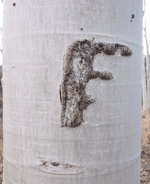
Here's what I’ve learned first-hand;

Additional clues added on May 8, 2016 are highlighted in bold lettering
I created this thread in the hopes of helping fellow Forrest Fenn treasure seekers connect the dots and find the treasure. I have been sorely disappointed in most forums and websites devoted to the search. More often than not (despite the best efforts of moderators to keep a thread respectful and on subject
 ) the forums deteriorate into name calling, hocus-pocus, ego-boosting and a lot of useless chatter. Often becoming so cluttered and convoluted that an entire weekend of digging is required to find a single “gem”.
) the forums deteriorate into name calling, hocus-pocus, ego-boosting and a lot of useless chatter. Often becoming so cluttered and convoluted that an entire weekend of digging is required to find a single “gem”. There is also the simple matter that very few want to give up “good” information lest it lead someone else to the treasure before them.
In an effort to share what I know about the location of Forest Fenn's treasure I have gathered everything I have collected over the years and made it available here. I have tried to remain as factual as possible but obviously there will always be some overlap between facts and conjecture - so please do not think I am an authority on anything. This information may lead you in the right direction or it might send you down a rabbit hole.
Please keep in mind, I have no answers and I am as blind as everyone else. I am nothing more than a fellow treasure seeker like yourselves and I do not know where the treasure is, but I do believe it exists and is out there waiting for anyone who can figure out the 9 clues and find it.
For some of you who have been on the hunt for a while now there may be nothing new here, but for those new to the chase this might help you get your search off the ground. I encourage anyone who would like to contribute anything, preferably more factual than conjecture, to please do so. If there is anything here that is incorrect then please feel to chime in an let us all know.
I wish everyone the best. Happy Hunting!
Here's the Poem;
As I have gone alone in there
And with my treasures bold,
I can keep my secret where,
And hint of riches new and old.
Begin it where warm waters halt
And take it in the canyon down,
Not far, but too far to walk.
Put in below the home of Brown.
From there it’s no place for the meek,
The end is ever drawing nigh;
There’ll be no paddle up your creek,
Just heavy loads and water high.
If you’ve been wise and found the blaze,
Look quickly down, your quest to cease,
But tarry scant with marvel gaze,
Just take the chest and go in peace.
So why is it that I must go
And leave my trove for all to seek?
The answers I already know,
I’ve done it tired, and now I’m weak.
So hear me all and listen good,
Your effort will be worth the cold.
If you are brave and in the wood
I give you title to the gold.
And with my treasures bold,
I can keep my secret where,
And hint of riches new and old.
Begin it where warm waters halt
And take it in the canyon down,
Not far, but too far to walk.
Put in below the home of Brown.
From there it’s no place for the meek,
The end is ever drawing nigh;
There’ll be no paddle up your creek,
Just heavy loads and water high.
If you’ve been wise and found the blaze,
Look quickly down, your quest to cease,
But tarry scant with marvel gaze,
Just take the chest and go in peace.
So why is it that I must go
And leave my trove for all to seek?
The answers I already know,
I’ve done it tired, and now I’m weak.
So hear me all and listen good,
Your effort will be worth the cold.
If you are brave and in the wood
I give you title to the gold.
A straightforward analysis the poem’s components;
Strong suppositions
- “Waters” is plural, while “halt” and “wood” are singular. This significantly changes the way those lines are read.
- “Brown” is capitalized making it a proper name.
- What “cold” does he mean with “brave the cold”? Does that mean that you must get in the water at some point or does he mean something else?
- “No paddle up your creek” could mean a dry creek or shallow water.
- “Put in” is the fishing term for a where a boat goes into the water.
- “Heavy loads” is a prospecting term. It refers to the material that need to be removed before gold could be dredge. This material was primarily big rocks or boulders.
- “water high” is a fishing term for mountain lakes.
- The word “blaze” is an old term for leaving a mark. In this sense a blaze the equivalent of “X” marks the spot.
Weak suppositions
- Perhaps the clues do not start with “Begin”, rather at someplace he “gone alone in there” hinting at it is someplace personal like a private fishing spot.
- “brave” could be an indication of something Native American.
- “wise” could be referring to an actual river or things associated with being wise such as an owl.
- When he refers to “it” what exactly is the “it” he refers to? The quest or something else?
- Perhaps the words “meek” “neigh” have no meaning despite what many people think and instead are used simply because they rhyme, much like the words “gaze” “go” and “good".

Here's the clues that I know;
- The treasure is in a 10” x 10” x 6” bronze box with a total weight of 42lbs.
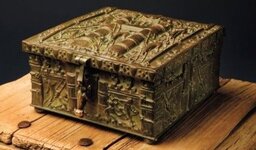
- The box is unlocked and the key is inside the box.
- The location of the treasure can be found on a good map.
- There are 9 clues in his poem and FF says to follow the clues precisely and in consecutive order.
- FF stated, “Do not mess with my poem” — meaning there is no cypher, anagram or code.
- There are additional clues for those who can decipher them in FF's book The Thrill of the Chase.
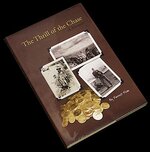
- The treasure is somewhere on the highlighted portion of the map in FF's book Too Far to Walk.
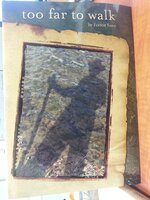
- The treasure is not in a graveyard, an outhouse or associated with any structure.
- Where warm waters halt is not a dam.
- It is not buried.
Not in a mine.
Not in a tunnel someplace
More than 8.35 miles north of Santa Fe
Definitely in the Rocky Mountains
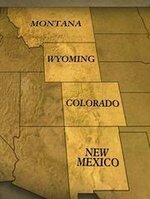
- The chest is exposed to rain and snow and can be scorched in a forest fire.
- The location of the chest must also be large enough to fit his entire body. An early draft of the poem included the line “Then take the chest and leave my bones.” Which might still be the case if FF had his way. He has been quoted saying, “I will not die in a hospital bed if I have a few breaths remaining. I don't want to give any more clues, but if I am not too feeble to return to the chest when my turn comes, I cannot think of any better place for my bones to rest for a few millennia.” — implying the location of the treasure must be secluded and relatively undisturbed.
- FF deposited the treasure in two trips. Meaning the treasure is at a distance a 79 year old man can make twice in one day while carrying the extra weight of the treasure. He was quoted saying, “I made two trips from my car to the hiding place and it was done in one afternoon.”
- FF is quoted saying, “If I was standing where the treasure chest was I would see trees, mountains, animals and smell pine needles (pinion nuts) and sage.
- FF once said, “There isn’t a human trail in very close proximity to where I hid the treasure.”
- He said when the clues are followed precisely they lead to the end of the rainbow and the treasure.
- The treasure is more than 300 miles North of Toledo.
- It is in the Rocky Mountains.
- It is NOT in Idaho or Utah.
- The four states that might contain the treasure are; Montana, Wyoming, Colorado or New Mexico.
- The treasure is above 5,000 feet and below 10,0000.
- Do NOT go anywhere an 80 year old man could not go.
- It is where a child could pick it up.
- FF thinks the treasure could remain undisturbed for a hundred, even a thousand, years. This implies it is someplace that is not likely to change or be developed any time soon.
- Bring a sandwich and a flashlight. Meaning you’ll be out there for a while and the treasure may be tucked away in a place where light does not reach.
- FF knows people have been within 500 feet of the treasure. FF has stated, “Some folks correctly mentioned the first two clues to me in an email and then they went right past the other seven, not knowing that they had been so close”.
- In an interview FF was asked if the 9 clues from the poem were in existence when he was a kid and to his estimation would they still exist in 100 years or 1000 years? His answer, “The clues did not exist when I was a kid but most of the places the clues refer to did. I think they might still exist in 100 years but the geography probably will change before we reach the next millennia.”
Comments made by FF
•Don’t let logic distract you from the poem (2-12-2016)
•Chest weights 42 pounds plus, best to have gloves (3-11-2016)
•If you know precisely where it is you can probably retrieve it in any weather (12-11-2015)
•Shut your engine off until spring (12-04-2015)
•A good solve is frequently lost in a poor execution (1-15-2016)
•“Until someone finds the treasure they will not know for sure that they have discovered the first clue.” (Dal’s Blog – “Forrest Gets Mail – 9 / November 2, 2015)
•“The problem searchers make is that they don’t dwell long enough on the first clue. If you can’t find the first clue you don’t have anything. People driving down the street looking for a blaze, because THAT’S ONE OF THE CLUES, but you can’t start in the middle of the poem and find the treasure.” (Outside: Live Bravely – August 11, 2015)
•“If I was standing where the treasure chest is, I see trees, I see mountains, I see animals, I’ll smell wonderful smells of pine needles or pinon nuts, sage brush. And I know the treasure chest is wet.” – (New Mexico True Story – February 4, 2015)
•Forrest responded the next day saying – “I just watched that New Mexico Tourism video again and must say that I didn’t say what I was thinking. You cannot smell a pinon nut, but those who pick them know that in doing so you get pine pitch all over your hands, and pine pitch smells about the same no matter what kind of pine tree you are talking about. Looking back I think I wanted to say I could smell pine needles, not pinon nuts. Sorry I kicked a hornet’s nest with that comment.” – (Dal’s Blog – Forrest LIVE on HuffPost.. / February 5, 2015)
•Another response – “That video didn’t have any clues.” “Fenn said if the treasure were in the wilderness, of course it would be wet….he erred in mentioning pinon nuts. He really meant pine needles” – (The New Mexican – February 8, 2015)
•What surprises me a little is that nobody to my uncertain knowledge has analyzed one important possibility related to the winning solve.” (MysteriousWritings Blog – Six Questions Yet Again with Forrest Fenn: Always a Treasure! / February 4, 2015)
•“I will say that I walked less than a few miles (whole trip of hiding the chest and treasure) if that will help. I just looked “few” up and one definition is “scant.” Why do I sound like I’m talking in circles” – (MysteriousWritings Blog – Talking in Circles/ October 13, 2014)
•“While it’s not impossible to remove the blaze it isn’t feasible to try, and I am certain it’s still there” (Dal’s Blog – The Nine Clues…Part Thirtyone / September 26, 2014)
•“There are many places in the Rocky Mountains where warm waters halt, and nearly all of them are north of Santa Fe. Look at the big picture, there are no short cuts.” (MysteriousWritings Blog – Featured Questions: Warm Waters and Geography / August 12, 2014)
•“The spot where I hid the treasure was in my mind from the time I first started thinking about the chase. It is special to me and there was never another consideration. I was going to make it work no matter what. In my reverie I often find myself stealing away to that place and I will always consider it to be mine.” (MysteriousWritings Blog – Questions with Forrest / July 5, 2014)
•“When I am in the moutains or in the desert, the last place I want to be is on a trail…..There isn’t a human trail in very close proximaty to where I hid the treasure” (MysteriousWritings Blog – Questions with Forrest / June 28, 2014)
•“No specialized knowledge is required…..My Thrill of the Chase book is enough to lead an average person to the treasure” (MysteriousWritings Blog – Questions with Forrest / June 27, 2014)
•“The clues did not exist when I was a kid but of most of the places the clues refer to did. I think they might still exist in 100 years.” (MysteriousWritings Blog – Questions with Forrest / June 25, 2014)
•“Many are giving serious thought to the clues in my poem, but only a few are in tight focus with a word that is key.” (MysteriousWritings Blog – Questions with Forrest / February 4, 2014)
•“When I hid it and was walking back to my car, I started laughing out loud and I said ‘Forrest Fenn…did you really do that?’” – (Moby Dickens Book Shop Signing / November 2, 2013)
•“There are several people that have deciphered the first two clues. I don’t think they knew it, because they walked right on past the treasure chest.”– (Moby Dickens Book Shop Signing / November 2, 2013)
•“I think kids have an advantage (finding the treasure). Don’t ask me to explain that.” – (Moby Dickens Book Shop Signing / November 2, 2013)
•“…that’s why I told people I hid the treasure chest when I was 79 or 80 years old because I don’t want the exact date to be known because I’m afraid somebody will go check the rental car records and how many miles did Mr. Fenn put on the truck or the car…so I don’t answer those kinda questions…but shoot that person that sent in that email…” – (Moby Dickens Book Shop Signing / November 2, 2013)
•“I have not had anybody tell me the answer to that clue (the unintended one in TFTW). If you read my preface it doesn’t take a genius to figure out, I think, what they’re talking about but…there are clues in my new book that can help a person.” – – (Moby Dickens Book Shop Signing / November 2, 2013)
•“I’ve said before the treasure chest is heavy. And it…I made two trips to hide it where I wanted it to be.” – (Collected Works Bookstore Signing / October 22, 2013)
•“What is wrong with me just riding my bike out there and throwing it in the ‘water high’ when I am through with it?” – (Dal’s Blog – “Forrest Gets Mail… / October 3, 2012)
•“No need to look for the treasure in a place where a 79 or 80 year old man couldn’t go with a 44 pound treasure chest full of gold and precious gems.” – (Dal’s Blog – “Forrest Gets Mail… / October 3, 2012)
•“My church is in the mountains and along the river bottoms where dreams and fantasies alike go to play” (The Thrill of the Chase – page 4
Here's a short personality profile of FF;
- 20 years in the military and a third of his book The Thrill of the Chase devoted to that time of his life
- Very private, as indicated by his reactions in the chapters from The Thrill of the Chase such as his reaction to the clerk in “Important Literature” and the gossip of the women in “No Place for Old Biddies”.
- He identifies with the old west and has a great interest, and extensive knowledge, of Native American artifacts.
- By his own admission, FF has been consumed by collecting arrowheads and fishing.
- Openly discusses in The Thrill of the Chase the steps he went through to come to terms with his own mortality
Here's what I suspect;
- The odd phrasing of “Put in” is a reference to a place on a river where people put boats in water which are simply called a “Put in”
- “High water” is another term for mountain lakes
- In the phrase “In the wood” — wood is singular, not plural — which leads me to think it is deliberate
- FF mentions the name “Gardiner” and “Treasure Island” immediately after his poem in The Thrill of the Chase which seems to be deliberate. Gardiner is just outside of Yellowstone and Montana is known as the “Treasure State”.
- If you turn FF’s “The Thrill of the Chase” upside down and look at it’s cover the overlaying pictures match nearly perfectly with the outline of the states of Montana, Idaho, Wyoming, Utah and Colorado. With the "gold" in place for Montana. This may be a coincidence but for some reason I think not.
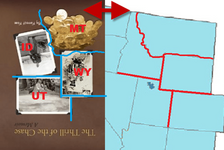
Here is what I think;
- Get to know more about Forest Fenn. Knowing more about FF will help better understand and interpret the clues in the poem by understanding what the words mean to him. For example, what experiences have left a mark on his life? i.e. The military, Yellowstone, Fly-fishing, Lewis and Clark, collecting antiquities — in particular Native American artifacts. For example, in “Begin where the warm waters halt” not only does "Halt" not rhyme but is an odd word choice. Halt is more of a military term. Could halt be a clue pointing towards a military installation of some type? An old Fort perhaps? In “brave the cold” could the word “brave” be a clue in itself since it is commonly used in reference to Native Americans and FF has a great interest in Native American artifacts? In “Wise and in the wood” could the word “wise” be a reference to the Wise River in Montana or the several locations that pop up when we Google things associated with being wise like “owl”?
- What if the clues do NOT start at “Begin…”? The first stanzas of the poem is often disregarded as little more than a lead-in but the statement “I have gone alone in there” could be a clue — either intentionally or deliberately. At some point in TTOTC he mentions going to a secret fly-fishing spot he has never taken anyone to before. To me that seems to be a logical connection.
- Here is a passage gleaned from the internet, (sorry, I do not remember who wrote it) FF describes “a secret location” where his family stashed their fishing gear during the off-season. FF was quoted saying, “We just drove the car out into the forest about half a mile, and unloaded everything,” FF goes on to write that it was always there when they returned. When reading this I often wondered why stash the gear in a place where it might get damaged or stolen when they could have just as easily taken it with them when they left. I would think this might be because leaving the gear behind made the hike back easier which implies the hike was a bit of a commitment or stashing the gear was more of a curiosity whether their “secrete spot” was really as secluded and secret as they thought.
Here is a picture of a possible "blaze" created by FF

Here's what I’ve learned first-hand;
- My brothers and I have made two trips to Montana already with plans on a third within the next month. What we’ve learn is that there is no substitute for lacing up the boots and checking things out in person. Often what may look good on paper does not pan-out once you get there. For example, one of the places we checked out was the Joe Brown Trail in Montana. Looked great on a map but once we got there it became evident almost immediately that this was not the place. There was no way a 79 year old man made this hike twice in one day, especially carrying the weight of the treasure with him.
- We were victims of “confirmation bias”. We were so sure we had the right interpretation that we made the 17 hour drive to Montana from our home over 1,600 miles away without having a plan “B” in place. This resulted in us having to rethink our options on the spot which did not turn out to well. Even though we enjoyed the adventure we still felt stupid for making such a preventable blunder and wasting our opportunity.
- If the blaze FF mentions is indeed the equivalent of an “X” marks the spot then it is not likely to be on a tree. First, the local wildlife scrapes the trees leaving them heavily scarred and easy for a manmade mark to be overlooked or covered up. Also trees typically do not last for hundreds of years and definitely not for a thousand. This leads me to believe that the blaze might be a mark on a large stone, possibly chiseled or, as I am inclined to believe, painted using the same techniques used by Native Americans when they marking pottery and the inside of caves.
- There is a need for a natural barrier. One of the first things I noticed when searching firsthand was the need for some type of barrier to prevent tourists from stumbling upon the treasure. The question then becomes what natural barriers exist that would deter the average person. I would think things like a river or standing bodies of water, or something akin to this and likewise inaccessible, requiring purposeful intent for a person to go there.
Last edited:



